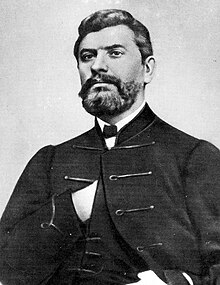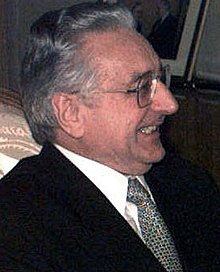| Revision as of 23:16, 17 February 2013 editTimbouctou (talk | contribs)Autopatrolled, Extended confirmed users, Pending changes reviewers71,646 edits rv to last good version by Joy← Previous edit | Revision as of 20:45, 6 March 2013 edit undoAddbot (talk | contribs)Bots2,838,809 editsm Bot: Migrating 3 interwiki links, now provided by Wikidata on d:q1265120Next edit → | ||
| Line 81: | Line 81: | ||
| ] | ] | ||
| ] | ] | ||
| ] | |||
| ] | |||
| ] | |||
Revision as of 20:45, 6 March 2013


Croatian nationalism is the nationalism that asserts that Croats are a nation and promotes the cultural unity of Croats.
Modern Croatian nationalism first arose in the 19th century in response to magyarization of Croatian territories under Hungarian rule. It was based on two main ideas: a historical state right based on a continuity with the medieval Croatian state and an identity associated with the Slavs. This period started with the Illyrian movement, which created the Matica hrvatska and promoted the use of Croatian language. Illyrianism spawned two political movements - the Party of Rights named after the state right concept (pravaštvo), led by Ante Starčević, and the Yugoslavism under Josip Juraj Strossmayer, both of which were limited to inteligentsia.
Croatian nationalism became a mass movement in the Kingdom of Yugoslavia through Stjepan Radić's Croatian Peasant Party. The most fervent Croatian nationalists prior to World War II organized in the Ustaša movement of Ante Pavelić, which in turn collaborated with Nazi Germany and fascist Italy in the Independent State of Croatia during World War II. Croatian nationalism then became largely dormant, except for the Croatian Spring, until the breakup of Yugoslavia and the Croatian War of Independence.
History
Austria-Hungary

In the 19th century, opposition by Croats to maygarization and desire for independence from Austria-Hungary led to the rise of Croatian nationalism. The Illyrian movement, originally associated with Croatian cultural nationalism but later with Pan-Slavism, founded the Matica Hrvatska (Croat Literary-Cultural Foundation) in 1842 that promoted the Croatian language and demanded that Croatian ("Illyrian") be adopted as the Croatia's official language. Illyrianists during the Revolutions of 1848 sought to achieve political autonomy of Croatia within a federalized Habsburg monarchy. Ante Starčević founded the Party of Rights in Croatia in 1861 that argued that legally, Croatia's right of statehood had never been abrogated by the Hapsburg monarchy and thus Croatia was legally entitled to be an independent state. Starčević regarded Croatia to include not only present-day Croatia but also Bosnia and Herzegovina, Slovenia, Serbia—all people in this Greater Croatia whether Catholic, Muslim, or Orthodox were defined as Croats.
During the 19th to mid-20th century Croatian nationalists competed with the increasily Pan-Slavic Illyrian movement and Yugoslavists over the identity of Croats. The founder of Yugoslavism, Croatian Bishop Josip Juraj Strossmayer advocated the unification of Croat lands into a Yugoslav monarchical federal state alongside other Yugoslavs. However in spite of both Starčević's and Strossmayer's competing visions of identity, neither of their views had much influence beyond Croatia's intelligentsia.
Kingdom of Yugoslavia

Croatian nationalism became a mass movement under the leadership of Stjepan Radić, leader of the Croatian People's Peasant Party after 1918 upon the creation of Yugoslavia. Radić opposed Yugoslav unification, as he feared the loss of Croats' national rights in a highly centralized stated dominated by the numerically larger Serbs. The assassination of Radić in 1928 provoked and angered Croatian nationalists with the centralized Yugoslav state, and from 1928 to 1939, Croatian nationalism was defined as pursuing either some form of autonomy or independence from Belgrade. In 1939, a compromise between the Yugoslav government and the autonomist Croatian Peasant Party led by Vladko Maček was made with the creation of an autonomous Croatia within Yugoslavia known called the Banovina of Croatia.
Independent State of Croatia
Croatian nationalism reached a critical point in its development during World War II, when the Croatian extreme nationalist and fascist Ustaše movement took to governing the Independent State of Croatia (NDH) after the invasion of Yugoslavia by the Axis Powers and the creation of the NDH at the behest of Fascist Italy and Nazi Germany as an Italo-German client state. The Ustaše committed mass genocide against Serbs and Jews, and persecuted political opponents, including the communist Yugoslav Partisans who fought against them.
Communist Yugoslavia
After the defeat of the Axis Powers in 1945 and the rise of communist Josip Broz Tito as leader of a new communist-led Yugoslavia, Croatian nationalism along with other nationalisms were suppressed by state authorities. During the communist era, some Croatian communists were labeled as Croatian nationalists, respectively Ivan Krajačić and Andrija Hebrang. Hebrang was accused by Serbian newspapers that he influents Tito to act against Serbian interests, in reality Tito and Hebrang were political rivals, since Hebrang advocated Croatian interests at the federal level and was one of the major Yugoslav Partisan leaders. Hebrang also advocated change of Croatian borders, since, according to him, Croatian boundaries were clipped by Milovan Đilas' commission.He also argued against unfair exchange rates imposed on Croatia after 1945 and condaming show trials against people labeled as collaborationists. Hebrang wasn't a serious threat to Serbian interests, since he was demoted several times and in 1948 he was put under house arrest, and later killed.
Croatian nationalism did not disappear but remained dormant until the late 1960s to early 1970s with the outbreak of the Croatian Spring movement calling for a decentralized Yugoslavia and greater autonomy for Croatia and the other republics from federal government control. These demands were effectively implemented by Tito's regime. Croatian communists started to indicate on Serbian dominance in commanding party posts, posts in the army, police and secret police. However, main subject was subordinate status of Croatian language. In 1967 Croatian Writers' Association called for designation of Croatian language as a distinct language both for educational and publishing purposes. Because of such demands Tito gave an order to purge reformers in 1971 and 1972. Some 1,600 Croatian communists were ejected from the Communist Party of arrested.
Such measures stopped the rise of nationalism in Yugoslavia, but Croatian nationalism continued to grow among Croat diaspora in South America, Australia, North America and Europe. Croatian political emigration was well-financed and often closely co-ordinated. Those groups were anti-communist since they originate from political emigrants who left Yugoslavia back in 1945.
Croatian nationalism revived in both radical, independentist, and extremist forms in the late 1980s in response to the perceived threat of the Serbian nationalist agenda of Slobodan Milošević who sought a strongly centralized Yugoslavia. Croatia declared independence from Yugoslavia in 1991 leading to the Croatian War from 1991 to 1995.
Modern Croatia and Bosnia and Herzegovina

Beginning in the 1980s, the Croatian nationalist movement was led by former communist general and historian Franjo Tuđman. Tuđman was, at first, a prominent communist, but in the 1960s he began to embrace nationalism. He soon earned the favour of the Croat diaspora, helping him to raise millions of dollars toward the goal of establishing an independent Croatia. Tuđman gathered Maspok intellectuals and sympathisers from among diaspora Croats and founded the Croatian Democratic Union (HDZ) in 1989.
In 1990, Tuđman's HDZ rose to power in the face of Serbian aggression against Croatia. The following year, war broke out in Bosnia and Herzegovina.
The Croatian ruling elite helped the Bosnian HDZ to rise to power. The first leaders of the Bosnian HDZ opposed Tuđman's idea of division of Bosnia and Herzegovina between Croatia and Serbia; in response, Mate Boban was installed as leader of the HDZ. He founded the Croatian Republic of Herzeg-Bosnia with the goal to merge it with Croatia at the end of the war. Boban's project crashed in 1994 with the creation of the Federation of Bosnia and Herzegovina.
During the war, Tuđman's acts were criticized by members of the Croatian Party of Rights, such as Dobroslav Paraga, Ante Paradžik, and Blaž Kraljević. They accused both Tuđman and the HDZ for betrayal of Croatian nationalist ideals on account of the war with Bosniaks and attempts to divide Bosnia and Herzegovina between themselves and the Serbs. Often, such individuals ended up arrested or killed.
The Croatian Party of Rights and other rights parties like Croatian Pure Party of Rights and the Croatian Party of Rights 1861 are the main Croatian nationalist parties in present-day Croatia. Parties of a similar orientation exist in Bosnia and Herzegovina, the largest being the Croatian Party of Rights of Bosnia and Herzegovina.
See also
- Croats
- Croatian culture
- Nationalism
- Irredentism
- Bosnianism
- Dalmatianism
- Serbian nationalism
- Albanian nationalism
- Hungarian nationalism
- Montenegrin nationalism
- Yugoslavism
- Greater Croatia
- Greater Albania
- Greater Hungary
- Greater Serbia
- Yugoslavia
References
- Notes
- ^ Motyl 2001, p. 104. Cite error: The named reference "FOOTNOTEMotyl2001104" was defined multiple times with different content (see the help page).
- ^ Motyl 2001, p. 105. Cite error: The named reference "FOOTNOTEMotyl2001105" was defined multiple times with different content (see the help page).
- Motyl 2001, pp. 104–105.
- MacDonald 2002, p. 191.
- ^ MacDonald 2002, p. 99.
- ^ MacDonald 2002, p. 100.
- Nizich 1992, p. 29.
- ^ Ramet 1999, p. 178.
- Bibliography
- Motyl, Alexander J. (2001). Encyclopedia of Nationalism, Volume II. Academic Press. ISBN 0-12-227230-7. Retrieved 2013-02-03.
{{cite book}}: Invalid|ref=harv(help) - MacDonald, David Bruce (2002). Balkan holocausts?: Serbian and Croatian victim-centred propaganda and the war in Yugoslavia. Manchester: Manchester University Press. ISBN 0-7190-6466-X.
{{cite book}}: Invalid|ref=harv(help) - Nizich, Ivana (1992). War Crimes in Bosnia-Herzegovina. Manchester: Helsinki Watch. ISBN 1-56432-083-9.
{{cite book}}: Invalid|ref=harv(help) - Ramet, Sabrina P. (1999). The radical right in Central and Eastern Europe since 1989. The Pennsylvania University Press. ISBN 0-271-01810-0.
{{cite book}}: Invalid|ref=harv(help) - Uzelac, Gordana 2006. The Development of the Croatian Nation: An Historical and Sociological Analysis. Lewiston, NY: Edwin Mellen Press.